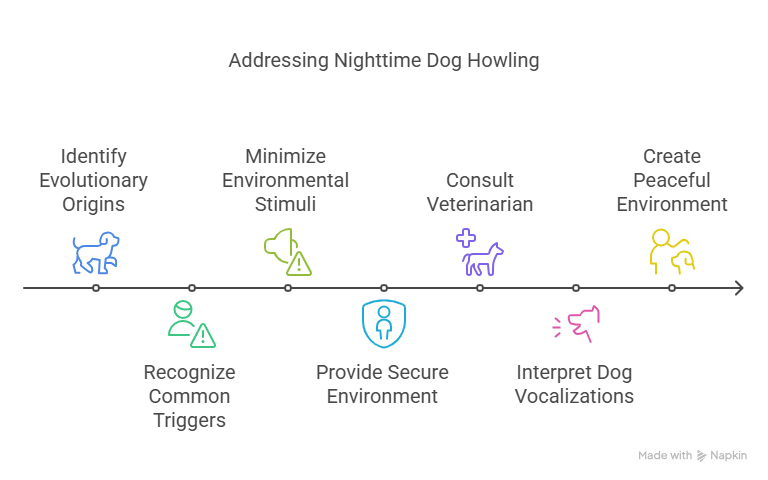Have you ever been awoken in the middle of the night by the sound of your dog howling? It’s a haunting and often puzzling experience. As a dog owner, it’s natural to wonder what’s behind this behavior.
Dog howling at night can be attributed to various factors, including instinct, emotional responses, and environmental stimuli. Understanding the reasons behind this behavior is crucial to addressing the issue and ensuring a peaceful night’s sleep for both you and your pet.
This article will explore the science behind dog howling, examining the potential causes and offering insights into how to mitigate this nighttime behavior.
The Science Behind Canine Howling
Understanding why dogs howl requires a look into their evolutionary past and the science behind their vocalizations. Dogs have been communicating with each other through various forms of vocalizations for centuries, and howling is one of the most distinctive and intriguing forms.
Evolutionary Origins of Howling
Howling has its roots in the wild ancestors of domestic dogs. Wolves use howling as a form of long-distance communication, helping them locate each other and reinforce social bonds. This behavior has been inherited by domestic dogs, who may howl to communicate with their human family or other dogs.
How Howling Differs from Other Vocalizations
Unlike barking or whining, howling is a more primal and emotive form of expression. Dogs often use howling to convey a specific need or emotion, such as loneliness or anxiety. Understanding canine howling can provide insights into a dog’s emotional state and needs.
The Acoustic Properties of Howls
The acoustic characteristics of a dog’s howl can vary significantly, depending on the breed and individual dog. Research into canine communication through howling has shown that different howls can convey different information, such as the dog’s location or emotional state.
Why Dogs Howl at Night: Common Triggers
Understanding why dogs howl at night requires examining the common triggers that cause this behavior. Dogs howl in response to various stimuli, which can be broadly categorized into environmental, emotional, and medical factors.
Response to Environmental Stimuli
Dogs often respond to environmental stimuli that prompt them to howl.
Sirens and High-Pitched Sounds
Sirens and other high-pitched sounds are common triggers for howling. Dogs may respond to these noises by howling as a form of communication or response.
Other Animals and Territorial Responses
The presence of other animals, especially at night, can trigger howling due to territorial instincts or alerting their human companions.
Emotional Causes for Nighttime Howling
Emotional factors also play a significant role in nighttime howling.
Separation Anxiety and Loneliness
Dogs suffering from separation anxiety or loneliness may howl at night due to distress.
Attention-Seeking Behavior
Some dogs howl to seek attention from their owners, especially if they have learned that howling elicits a response.
Medical Issues That May Trigger Howling
Medical issues can also cause dogs to howl at night. Conditions such as pain, discomfort, or cognitive dysfunction should be considered.
| Trigger | Description |
|---|---|
| Sirens and High-Pitched Sounds | Triggers howling as a response |
| Other Animals | Triggers territorial responses |
| Separation Anxiety | Causes distress leading to howling |
| Medical Issues | Pain or discomfort causes howling |

By understanding these common triggers, dog owners can take steps to address their dog’s nighttime howling, whether it’s through training, environmental changes, or seeking veterinary advice.
Conclusion: How to Address Your Dog’s Nighttime Howling
Understanding why dogs howl at night is the first step towards addressing the issue. By recognizing the evolutionary origins of howling and the common triggers such as environmental stimuli, emotional causes, and medical issues, you can take steps to prevent excessive dog howling.
To effectively address your dog’s nighttime howling, start by identifying the underlying cause. If your dog is responding to environmental stimuli, taking steps to minimize these triggers can help. For emotional causes, providing a comfortable and secure environment is key. In cases where medical issues are suspected, consulting a veterinarian is essential.
Learning to interpret dog vocalizations can also help you better understand your dog’s needs and reduce howling. By combining this understanding with the appropriate measures, you can create a more peaceful environment for both you and your dog.

FAQ
Why do dogs howl at night?
Dogs howl at night due to various reasons, including response to environmental stimuli, emotional causes such as separation anxiety or loneliness, and potential medical issues. Understanding the underlying cause is crucial to addressing the behavior.
How can I stop my dog from howling at night?
To stop your dog from howling at night, you need to identify and address the underlying cause. This may involve training, providing adequate exercise and mental stimulation, or seeking professional help if the howling is due to separation anxiety or a medical issue.
Is my dog howling due to a medical issue?
If your dog’s howling is accompanied by other signs of distress or discomfort, such as whining, pacing, or changes in appetite, it may indicate a medical issue. Consult with a veterinarian to rule out any underlying health problems.
Can I train my dog to stop howling?
Yes, you can train your dog to reduce or stop howling. Techniques include positive reinforcement training, desensitization to triggers, and teaching alternative behaviors. Consistency and patience are key to successful training.
Why do dogs howl in response to sirens?
Dogs often howl in response to sirens because the high-pitched sound can trigger their instinct to respond to a perceived call or threat. This behavior is rooted in their evolutionary history and is a form of canine communication.
How can I interpret my dog’s vocalizations?
Interpreting your dog’s vocalizations involves understanding the context and tone of the sounds. Howling can indicate a range of emotions and needs, from loneliness and anxiety to alerting you to potential threats. Paying attention to the pitch, volume, and frequency of the howling can help you better understand what your dog is trying to communicate.





